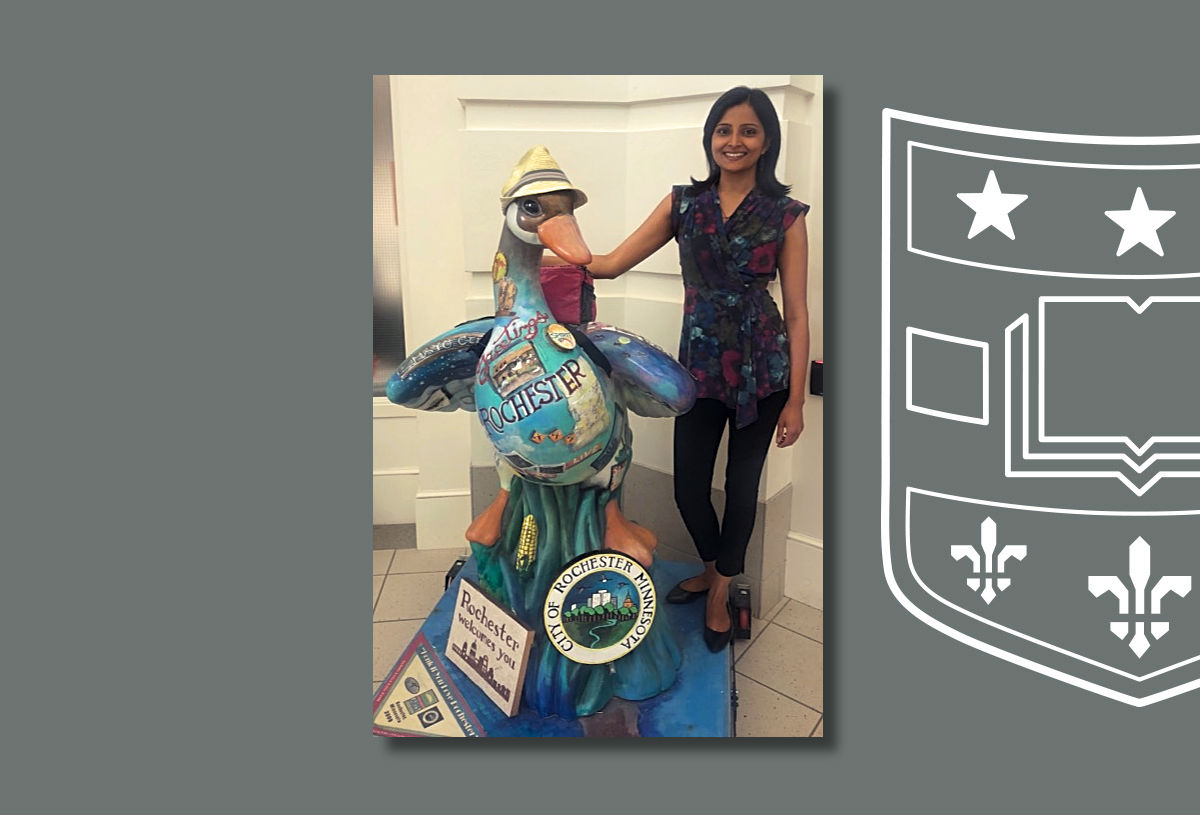Redesigning Rochester: a stint in management for a growing city
- September 26, 2018
- By WashU Olin Business School
- 3 minute read

Angela Lu, MBA ’19, is president of the Graduate Business Student Association and collaborated with Yukti Malhotra, MBA’19, on this blog post.
It’s not uncommon for us “business types” to get pegged into a rather inaccurate and narrow role. Outside of the business school, I encounter many scholars on campus who have dedicated their focus in other ways to improving the human experience and the world we live in.
Sometimes, I almost feel apologetic when I introduce myself as an MBA candidate; I can see in their eyes some shade of instinctive contempt, assuming I am just “money-minded.” Well, what’s wrong with that?
Yukti Malhotra proves that a graduate business education is just as applicable to nonprofit organizations and their missions as degrees in social work or public policy. How has she applied her skills to make real impact on a city in Minnesota? Let’s find out!
Summer Series No. 6: Give us 30 seconds on what you’ve been doing this summer.

I spent the summer as an Environmental Defense Fund Climate Corps fellow for the city of Rochester in Minnesota. This fellowship recruits graduate students—30 percent of whom are MBAs—to promote the ways in which organizations spearhead sustainability.
Rochester was a particularly interesting placement. It’s on the cusp of immense change. The city is home to the Mayo Clinic and is making strides toward its development objectives to become the world’s leader in healthcare. The city is also expected to double in size and generate more than 30,000 new jobs over the next 20 years.
Sustainability practices and infrastructure have grown important to support this influx. I helped craft Rochester’s sustainability strategy and examined the business case for green initiatives, which I presented to Mayor Ardell Brede and the city council.
I’ve always wanted to advance organizations that care about their social and global impact, especially since I’ve worked in international development for six years. The fellowship was a great opportunity to explore this interest while bringing to bear the finance, strategy, and project management skills I’ve gained at Olin.
I was also excited that Rochester offered access to a whole new part of the Midwest. I was able to make multiple trips to Minneapolis and to charming little towns in Minnesota and Wisconsin.
Have you put your “business school skills” to use in any unexpected ways?

A shot of the Mississippi overlook near Rochester.
Absolutely! Going into the fellowship, I was unsure about the degree to which I could flex my business school skills in the public sector. I was heartened to discover that all my projects dealt directly with finance and strategy.
A major takeaway was that regardless of the project or the industry, money matters. Building a compelling business case is key to gaining buy-in for any initiative—from investment to implementation. I was tasked with studying the financial viability of replacing municipal fleet and transit infrastructure with sustainable options, of upgrading streetlights to LEDs, and of reducing unnecessary lighting in city hall—efforts that could save Rochester more than $1 million annually.
Beyond finance, I also created a framework for Rochester’s official sustainability strategy. I developed guidance on the amount of greenhouse gas emissions reduction and number of energy efficiency projects the city should pursue to meet its goals. In addition, I benchmarked comparable cities that are ahead of the sustainability curve to identify and prioritize sustainability targets for Rochester.
What lessons do you think your colleagues at the city of Rochester learned from you? What lessons do you think your classmates can learn?
The biggest lesson for my colleagues was that over time, sustainability investments can pay for themselves in more ways than one. They can help Rochester become an environmentally friendly beacon of well-being, in line with its development plan, but do so in a financially feasible way.
I was encouraged to see the mayor and city council enthusiastically welcome these positive payoffs during my final presentation.
I also want my classmates to know that social good is not confined to the public and nonprofit sectors. There are many opportunities in business to do well by doing good. Across all industries and functional areas, companies are looking for talent to improve their triple bottom line.
If you want to learn more about the confluence of people, planet, and profit, make sure to get involved with Net Impact this year. You can register for the upcoming career conference here.
Contact Us
For assistance in finding faculty experts, please contact Washington University Public Affairs.
Monday–Friday, 8:30 to 5 p.m.
Sara Savat, Senior News Director, Business and Social Sciences
314-935-9615
sara.savat@wustl.edu
Kurt Greenbaum,
Communications Director
314-935-7196
kgreenbaum@wustl.edu
